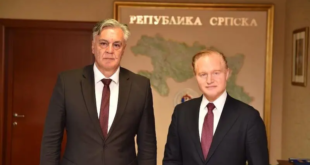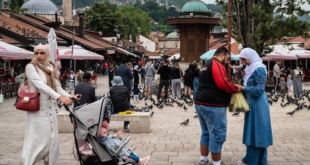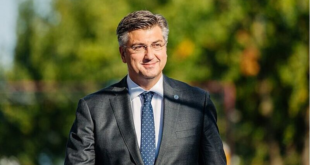Several hundred residents of the Bosnian Serb-dominated city of Visegrad gathered on 12 March to greet Mitar Vasiljevic, a convicted war criminal just released from prison after serving two-thirds of his sentence, Anes Alic writes for ISA Intel.
Trumpet players from Serbia played a fanfare on the streets as his convoy came to halt before his supports, whom Vasiljevic addressed, saying he had never been happier, and that he had been wrongfully convicted.
Vasiljevic, who worked as a waiter in a Visegrad hotel before the war, was found guilty on four charges of war crimes and was sentenced in 2004 to 20 years in prison – a term he would serve out in Austria. That sentence was reduced to 15 years after an appeal.
He was originally charged with six counts of crimes against humanity and four counts of violations of the customs of war, to all of which he pleaded not guilty.
Officials at the Hague-based International Criminal Tribunal for the former Yugoslavia (ICTY) said that apart from having served one-third of his sentence, Vasiljevic was released early because he had demonstrated his will to cooperate with the prosecution and good behavior in the Austrian prison, where he worked in the kitchen, apparently to everyone’s culinary satisfaction.
Culinary skills and good behavior aside, one of the crimes for which Vasiljevic was originally charged (but not convicted by the ICTY) is the Pionirska Street massacre in Visegrad, when in June of 1992 he and several other members of the White Eagles paramilitary unit gathered a group of some 100 Bosniak civilians, mostly woman and children, in an abandoned house. According to the charges, Vasiljevic then locked the door and smashed the windows so his unit could throw a grenade inside the house. The house was set ablaze and the occupants left to burn alive. Those who tried to escape through the widows were shot. Only a few survived.
Until the day he was arrested in January 2000, Vasiljevic had moved freely about the town, despite a Hague indictment against him.
I managed to locate one of the survivors of the massacre, who asked to me referred to only as “EK.” She told me that she had been locked in the Pionirska Street house with her son, who at the time was 13 years old. Her husband, like many other Visegrad men, escaped and fled from Bosnian Serb and Serbian paramilitary forces into the nearby forest.
According to EK, Vasiljevic (whom she had known all of her life) was driving a bus around town gathering up the remaining Bosniaks – mostly women, children and the elderly – ostensibly to hand them over to the Red Cross, which would move relocate them to territory under Bosnian government control.
Vasiljevic and his two cousins, Milan and Sredoje Lukic, convicted for the same crimes, placed the Bosniaks inside an abandoned house to await, they claimed, the arrival of the Red Cross representatives. Then all hell broke loose. EK said she managed to escape with her son through an open window after the attackers were sure that everyone had died in the fire.
She said that another woman and an elderly man also survived the massacre, but suffered from severe trauma. While recounting her story, EK showed little emotion, though her son, sitting in the corner, was visibly nervous, and for good reason.
EK became one of the key witnesses in the trial of Vasiljevic and his cousins. However, the trial chamber cleared Vasiljevic of the Pionirska Street massacre, saying that the prosecution had failed to obtain material evidence that he was present at the scene.
EK lived as the refuge with her son and husband after the war in Sarajevo. I have not kept tabs on EK since the interview, but one can only hope that she has not returned to her home in Visegrad, where Vasiljevic is now a free man. After all, she served as a key witness against him, and while her testimony was given in secret, under a pseudonym given her by the ICTY, Visegrad is a small town, and indeed, Bosnia is a small country, and she wouldn’t be hard to find.
In Bosnia and Herzegovina there are hundreds of victims, like EK, and many war criminal-heroes, like Vasiljevic, on all three sides of the ethnic divide. In such circumstances, it can only be strange to international community officials and random tourists that reconciliation has not been achieved after 14 long years.
Source: isn.ethz.ch
 Eurasia Press & News
Eurasia Press & News



